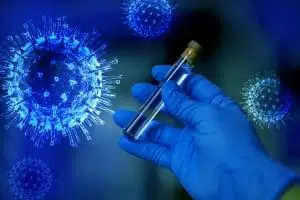South Central Illinois remains at the low level for COVID-19 hospitalizations.
The latest weekly CDC tracker shows three hospitalizations in Marion and Washington County during the last reporting week. Jefferson and Wayne Counties have two new hospitalizations. Clinton and St. Clair County reported 20 new hospitalizations. There were no new hospitalizations in Effingham, Fayette, Clay or Jasper Counties.
Marion County Health Department Administrator Melissa Mallow reports just one congregate care facility is currently on outbreak status. The facility in Centralia had three additional residents and two additional staff test positive in the past week, bringing the total number of cases in the facility to 11 residents and 14 staff.
Statewide, Illinois overall respiratory virus level remains at the moderate level, while only two counties statewide are at medium level for COVID-19 hospitalizations. Johnson and Massac County are repeating from last week.
IDPH Director Dr. Sameer Vohra says respiratory virus season is still upon us as flu continues to circulate. It is important to keep in mind that flu season can last until May.
If people do develop symptoms of a respiratory illness – including coughing, sneezing, sore throat, a runny nose or fever – IDPH recommends staying home and away from others to avoid spreading illness. If you need to seek medical care, you should wear a mask to limit the risk to others – or try to schedule a telehealth appointment. In addition, public health experts urge anyone who has been recently exposed to COVID-19 or other respiratory viruses to wear a mask when in crowded areas, and if visiting someone at high risk for severe disease. For more on when and where to use a mask, click HERE.
With RSV season now winding down in Illinois, the use of the RSV vaccine in pregnancy is no longer warranted. However, the shots that can be used to provide infants and young children protective immunity to RSV will continue to be available until the end of the season, and older adults can continue to get their RSV vaccine even after the season is declared over.


